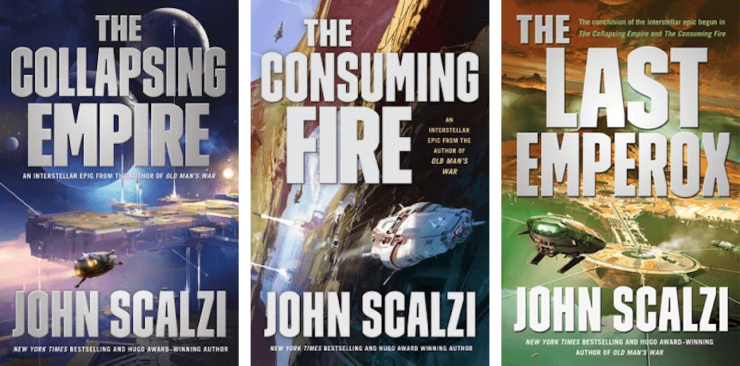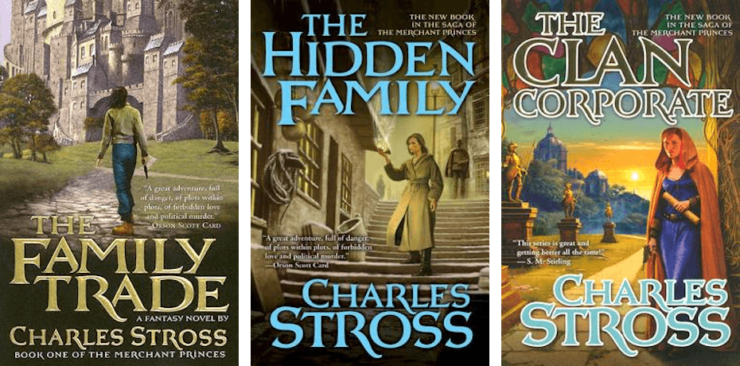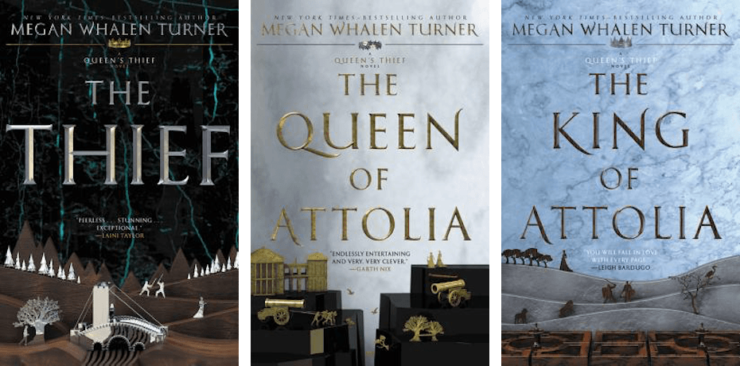Among life’s many pleasures is that little thrill one gets on completing a project, whether it is placing the last piece into a jigsaw puzzle, sliding the final book into its assigned place on a brand-new bookcase, or polishing off some DIY bricklaying as Fortunato watches. One could be forgiven for thinking this is a pleasure often denied readers, since so many series having languished before reaching their finales. Even I have given up on hoping Cao Xueqin will ever deliver the final, full, canonical edition of The Story of the Stone. However! As memorable as the exceptions are, many authors have seen their projects through to the end. Here are five (more) recent examples of completed SFF series.
James S. A. Corey’s The Expanse

- Leviathan Wakes (2011)
- Caliban’s War (2012)
- Abaddon’s Gate (2013)
- Cibola Burn (2014)
- Nemesis Games (2015)
- Babylon’s Ashes (2016)
- Persepolis Rising (2017)
- Tiamat’s Wrath (2019)
- Leviathan Falls (2021)
A billion or more years ago, enigmatic aliens attempted to commandeer Earth’s biomass for their own ends. That effort failed and the aliens themselves vanished. Relics remained—mechanisms still functional that could, in the right hands, transform humanity. Or more likely, annihilate it. What followed the first attempts to harness the alien protomolecule was a lengthy demonstration of the perils of hubris, not to mention the unintended consequences thereof.
Somehow at the centre of all this: noted grit-in-the-gears starship captain James Holden. Despite Holden’s lofty principles and infamous propensity for instigating chaos in the name of the greater good, governments persist in making use of his services because Holden’s other talent is being at the right place at the right time to shape history.
***
John Scalzi’s The Interdependency

- The Collapsing Empire (2017)
- The Consuming Fire (2018)
- The Last Emperox (2020)
The Interdependency’s founders had a simple dream: an interstellar community utterly dependent on ongoing trade for survival. No single world being self-sufficient, loss of trade means death. Trade, on the other hand, means profit, a comfortable share of which is funneled into the pockets of the oligarchs who created the Interdependency. A sufficient pittance slips through their fingers to ensure that the billions of peons are never quite miserable enough to overthrow the system.
The one tiny flaw in this otherwise perfect arrangement is that trade depends on unimpeded access to the little understood superluminal Flow. Without access to the Flow, there is no faster-than-light travel, and no trade between the worlds. No trade means mass death and societal collapse. Significant shifts in the Flow being inherently catastrophic, those dependent on it simply assumed that no such shifts could happen. As it turns out, this assumption is utterly wrong, and while the Interdependency has forewarning, it is not at all clear whether their rigid institutions will permit them to make use of it.
***
Charles Stross’ The Merchant Princes

- The Family Trade (2004)
- The Hidden Family (2005)
- The Clan Corporate (2006)
- The Merchants’ War (2007)
- The Revolution Business (2009)
- The Trade of Queens (2010)
- Empire Games (2017)
- Dark State (2018)
- Invisible Sun (2021)
Many children have dreamed of discovering that they are lost royalty. Miriam Beckstein, who had never had such a dream, nevertheless found it coming true (if as nightmare rather than pleasant dream). Miriam’s bio-mother was a world-walker with an inborn talent for stepping from one universe to another. Able to carry goods and information with them, Miriam’s long-lost kin, the Clan, enjoy vast wealth and power.
As Miriam discovers after making contact with her relatives, the Clan combines a casual attitude towards local law—thus the United States’ eventual view of the Clan as interdimensional narcoterrorists—with social views that would not have been out of place in a Norman court. Despite Miriam’s manifest intelligence and education, the Clan sees her primarily in terms of marriageability. Can Miriam reform her predatory, conservative kin before they are crushed by the inevitable consequences of their own actions? Read and find out.
***
Tsukumizu’s Girls’ Last Tour

- Volume 1 (2014, English translation 2017)
- Volume 2 (2015, English translation 2017)
- Volume 3 (2016, English translation 2017)
- Volume 4 (2016, English translation 2018)
- Volume 5 (2017, English translation 2018)
- Volume 6 (2018, English translation 2019)
At its height, the human species was able to reshape the entire world into vast urban structures. However, a talent for Trantorification was not accompanied by the necessary self-restraint needed to survive its own technology. By sisters Yuuri and Chito’s time, the golden age is long over. Humanity consists of tiny, isolated communities whose inhabitants are turning on each other with lethal intent.
Escaping their home village, the sisters explore the seemingly endless cityscape, sidestepping pitfalls, dead ends, and the mazework of the decayed infrastructure. In the short term, their goals are finding safety, food, and water. In the long run, their goal is to exit from the lifeless desert their city has become and find some pleasant arcadia…if such an exit exists, and if the old humans left any part of the planet alive. If not, at least Yuuri and Chito have each other.
***
Megan Whalen Turner’s Queen’s Thief

- The Thief (1996)
- The Queen of Attolia (2000)
- The King of Attolia (2006)
- A Conspiracy of Kings (2010)
- Thick as Thieves (2017)
- Return of the Thief (2020)
From the perspective of the Mede Empire, the peninsular kingdoms of Eddis, Attolia, and Sounis are ideal prey. They are prone to short-sighted rivalry, corruption, and blinkered insularity. All the Empire need do is figure out how to play the kingdoms off of each other and then pick some ambitious nobles to serve as well-behaved satraps. The three former kingdoms will become three new provinces in the vast, expanding empire.
Inconveniently for the Medes, the gods do not want to see the kingdoms absorbed into the empire. No doubt the gods could directly intervene in mortal affairs, but they prefer to act through their chosen servants. Thus, Eugenides, the renowned Thief of Eddis, becomes the reluctant mastermind charged with frustrating the inexorable Empire’s repeated attempts at conquest, for as long as it takes the Empire to get bored and move on—or until the pesky thief is permanently removed from play.
***
There are of course many recent examples I could have mentioned but did not (I considered Chloe Gong’s These Violent Delights, for example, but ultimately decided I wanted to focus on examples longer than a duology). No doubt you all can think of series whose inexplicable absence from this five-item list is an afront to both common decency and Ningauble of the Seven Eyes. Feel free to mention them all in comments.
In the words of Wikipedia editor TexasAndroid, prolific book reviewer and perennial Darwin Award nominee James Davis Nicoll is of “questionable notability.” His work has appeared in Publishers Weekly and Romantic Times as well as on his own websites, James Nicoll Reviews and the Aurora finalist Young People Read Old SFF (where he is assisted by editor Karen Lofstrom and web person Adrienne L. Travis). He is a four-time finalist for the Best Fan Writer Hugo Award and is surprisingly flammable.










